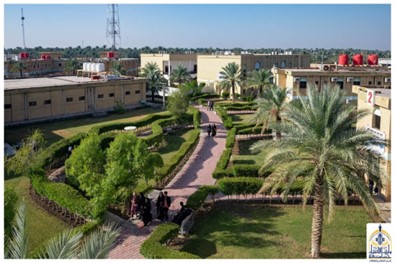
The University of Warith Al-Anbiyaa (PBUH), established in 2017, initially opened with four colleges: Administration and Economics, Engineering, Law, and Nursing. Over the years, it has grown to encompass eight colleges and 17 distinct departments. Founded as a nonprofit initiative by the Imam Hussein Holy Shrine, the university strives to create a forward-thinking educational environment equipped with the latest technology.
Located in a rural area on the outskirts of Karbala Governorate, the university occupies a vast single campus with a total area of 114,210 square metres. Its strategic placement along the Baghdad-Karbala route provides convenient access to both the Karbala region—a site of religious and historical significance—and essential transport links, including airports and government institutions.
The campus boasts a distinctive balance between built and natural environments, with only 13% of its area used for buildings, covering a ground floor building area of 13,921 square metres and a total building area of 36,783 square metres. With 87% of the campus preserved as open space, the University of Warith Al-Anbiyaa is committed to sustainability and environmental stewardship. Around 3.57% of the campus, or 4,083 m², is dedicated to forested areas, while an additional 31% (35,320 m²) is covered with planted vegetation. These green spaces not only enhance the aesthetic appeal of the university but also contribute to a cleaner, healthier environment, absorbing carbon dioxide and promoting biodiversity.
The significant presence of green areas provides students and faculty with scenic views and access to fresh air, fostering a natural environment conducive to concentration, creativity, and wellness. This thoughtful design underscores the university's commitment to sustainability, aligning with its mission to provide an enriching educational experience within an eco-conscious campus. By maintaining such a high ratio of green spaces, the University of Warith Al-Anbiyaa demonstrates a model of responsible campus planning, offering a sustainable, supportive atmosphere for students, faculty, and the broader community.